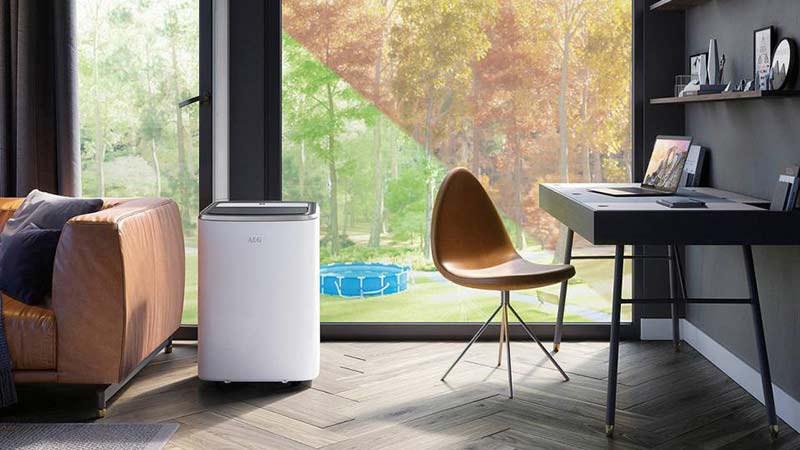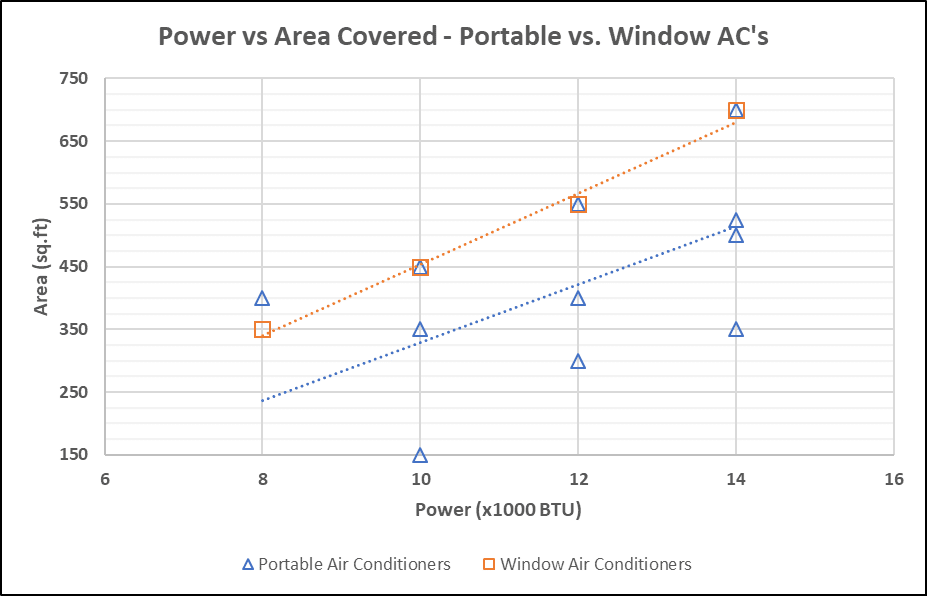We've independently reviewed this article to make sure it's as accurate as we can make it.
To find out more about our article creation and review process, check out our editorial guidelines.
Whatever side you stand on in the global warming debate, I bet you’ll agree with this. Having no AC when the heat is sweltering sucks, or if you have a central system that just can’t keep up with a heatwave. So how much does it cost to run a portable air conditioner?
How much it costs to run a portable air condition depends on the size (BTU) and your local electricity cost per kWh. For example, an 8,000 BTU portable air conditioner running for 8 hours a day at .13¢ per kWh will cost approximately $2.44 per day to run.
If you’re like me, math hurts. So I’m very happy to say we have a calculator that will help to simplify things for you. Keep reading, and I not only show you how it works, but I’ll also cover everything you want to know about keeping your air conditioning costs down.
How to Use the Calculator
It’s pretty simple, but here’s a quick walk-through.
- Power Draw. Find the BTUs of the portable air conditioner you have or you’re thinking of buying and enter it into the calculator. It will be converted into watts.
- Outside Temperature Field. This one might be a little tricky. I would try to come up with an average temp over the summer, not just whatever temperature it is on any given day. If the temperature ranges from 80 to 90 degrees during the hours you would use the air conditioner, base your entry on that.
- Hours and Days You’ll Run the Unit. In each case, just plug in how many hours or days you will use the unit.
- Your Electricity Cost. Click here to use our free calculator to know the electricity cost in your state or refer to your most recent bill.
Your Estimated Costs
The amounts provided by the calculator are simply estimates. There are far too many unknowns and variables to be able to give you an exact amount.
If you already have your portable air conditioner up and running, the best way to find out the exact amount it’s costing you to run is to check your bill. Depending on your power company, you may have an online option where you can see how much power you are using on any given day.
If you’re doing this, you want to check your bills for months in spring/autumn where you need very little heat or cooling to get a baseline for your home. Then use that to compare with your bills for the hotter months to see your cooling costs.
All that happens based on the outside temperature. On a 90 degree day, that cycle will happen more often than it does on an 80 degree day, meaning you’ll use more power.
The calculator factors for this in the temperature field. Depending on what temperature you input, it will base its estimate on the compressor running 30, 60, or 90% of the hours you run it in a day.
Portable vs Window Air Conditioners

Depending on your situation you might have the option to use either. But you may live somewhere that has windows that won’t accommodate a window air conditioning unit. Or maybe venting a portable AC will be problematic. In those cases, you may have no choice as to what to buy.
However, if you do have the luxury of choice, which is the best type to get? Here are some key factors to consider.
Pricing
Both portable and window models have a fairly wide range in pricing. This is because of price differences due to brand names as well as sizing. Clearly, a unit with a 5,000 BTU rating is going to be a lot less than an 18,000 BTU model. Having said that, portable units in the same range tend to be a bit cheaper than window units.
Installation
A portable unit can be placed anywhere you want in the home, but you do need to have somewhere to vent it outside. And some sort of kit is necessary to do this, as you can’t just leave a window open with the hose hanging out.
Window air conditioners need a stable mount to sit on, and they need to be mounted at a slight angle as well so they are able to drain. And they’re heavy. Also, there may be laws where you live about window units since they can fall. For example, in some cities, it’s against the law to install a window unit if there’s no balcony under it.
So if you have the floor space for it, a portable unit could be a better choice.
Portability
Of course, you could move your window unit from room to room if you wanted, but that’s going to take a lot more work than sliding the portable unit, which is on castors, across the floor.
You have the ability to move it with you during the day. Are you working from home? You could have the unit in your workspace during working hours, but move it to the bedroom to help combat those sweltering nights that keep you awake.
Your Space
If your space is at a premium, the window unit will win, hands down. Simply because it doesn’t take up any indoor space at all.
However, a portable unit can take up a considerable amount of space. So if you live in a tiny apartment this might not be the wisest choice for you.
Noise
Any air conditioner is going to make noise. However, the noise a window air conditioner makes is not only outside, it’s directed away from your home. A portable unit is in your home, and the noise is trapped in there with you.
One thing you can do if you’re still in the research phase is to check out the dB rating on any unit you’re looking at. The lower the decibels, the quieter the unit will be.
Efficiency
In a nutshell, window units tend to be more efficient than portable air conditioners. Meaning they will cool a larger space for less money.
In a bit more detail, here’s a comparison of both window and portable air conditioners and their power usage. You can see a sensible uptick in power usage in comparison to area. Things aren’t so sensible when you look at portable units.

Conclusion
So, you’ve done the calculation and have an estimate of how much it will cost you to run your portable air conditioner. And hopefully, you took a look at some of the differences between the two.
Depending on your circumstances, you might not have much choice between a portable and window air conditioner. Portable air conditioners are great, giving you an amount of freedom you just can’t get with a window unit. But if it’s all about cost—especially the cost to run your air conditioner—you might want to go for a window unit.
Thanks for reading through! I hope this information will help you make an informed decision. While you’re here, why not check out the related articles below. Maybe we can help with something else.







